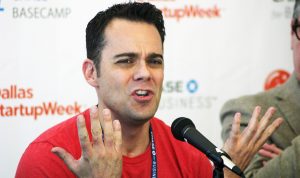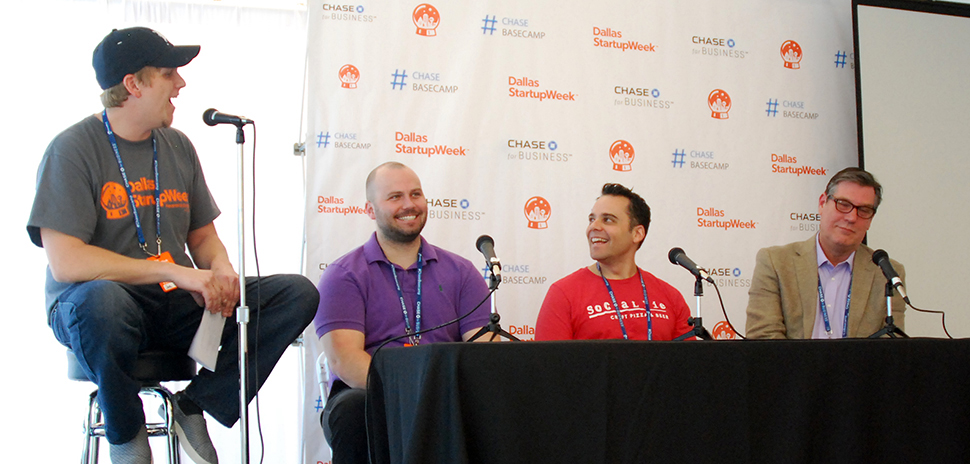Nick Backlund was a Minor League Baseball player. Javier Heredia flew commercial airplanes. Joe Groves worked as a self-employed businessman.
None of them had any restaurant experience before they launched their Dallas eateries, but that hasn’t held them back. Instead, they each partnered with chefs and others who had experience, used common business acumen, and tapped their creativity to make a mark in the city.
The three talked about the challenges of opening restaurant and bar concepts in today’s hypercompetitive world Thursday, as part of the Dallas Startup Week seminars.
FINDING THE LOCATION
Groves first opened Ellen’s Southern Kitchen in the fall of 2012 in the West End. The area was still a ghost town at that time so Ellen’s was actually part of the renaissance that has occurred there.
The key was to identify a void and fill it.
“What was missing was that indigenous food from this area, Texana,” Groves said.
Ellen’s all-day breakfast thrived in the West End to the point that Groves had to move to a bigger location.

Javier Heredia, owner of Social Pie, makes a point during the Dallas Startup Week panel. [Photo by Lance Murray]
Heredia knew he wanted to open a socially conscious restaurant, but wasn’t immediately sold on a location near Dallas Love Field.
Then, he looked at the number of apartments, hotels, and travelers going to the airport.
“It’s right in front of you,” Heredia said. “When I saw it, filling a void, there’s nothing there.”
He opened Social Pie on Maple Avenue with the intent of giving a percentage of the proceeds to a rotating list of charities.
Opening a new bar in Deep Ellum proves to be a challenge, too.
Backlund had studied economics, but his focus was always on baseball. He had a dream of opening a bar where people could enjoy one-of-a-kind cocktails. The result is HIDE, which opened just two months ago.
“HIDE is an experiential concept,” Backlund said. “It’s not just another cocktail. You have to dive into that drink to understand the passion of what goes into our work every day.”
HIRING A WORKFORCE
Finding good employees is also a challenge. The character and makeup is often more important than experience, the restaurant owners agreed.
“I can’t train someone to be a good person, a hospitable person,” Backlund said. “I 100 percent hire the person.”
Ultimately, it’s cheaper to retain a person than continuously hire new ones.
Heredia is a strong believer in looking people in the eye, engaging, and talking to them.
“I can’t train someone to be a good person, a hospitable person.”
Nick Backlund
“We really train our staff to be that way,” Heredia said.
As the owner, Heredia said it’s not uncommon to see him making dough, cleaning the bathroom, or delivering a pizza.
“I don’t lead from the back yelling at people. I will never ever ask you to do something that I wouldn’t do myself,” Heredia said.
TO TIP OR NOT TO TIP?
Dallas’ Canary by Gorji made headlines last year by deciding it would no longer accept tips for its waiters. Instead, it would pay them a regular wage and increase menu prices by up to 20 percent.
Backlund thinks the system works fine the way it is, where waiters have incentives to offer good service and upsell.
“Why would they care if someone has a good experience?” Backlund said.
That’s true, Groves said, but long-term, a cultural shift needs to occur where waiters are given a commission for the size of the check rather than relying on the customers to tip.
“You can never pay too much commission,” Groves said. “That means you sold something. I look at waiters as sales people. Their tips are commission in a way, the more they ring up, the more they make.”
It’s also important to share the financial books with employees, so they’ll buy into the company.
“Having inside knowledge, don’t spread this around, but we want you to know what an important part of our business you are,” Groves said.
THE ISSUE OF HEALTH INSURANCE
Benefits are a troublesome topic, Groves said.
The owner of Frankie’s sports bar blamed the Affordable Healthcare Act for his decision to close the Fort Worth location last year.
Many of Ellen’s employees opt out of health insurance because of the cost.
“They’re all young so they think they’re invincible,” Groves said.
This could become a bigger problem as restaurants expand and stay in compliance with the AHA.
“Long-term employees are a crucial fixture of the company and would benefit from having a piece of the business.”
Joe Groves
Instead, a better solution would be an employee stock program where workers get partial ownership in the company, Groves said.
“Long-term employees are a crucial fixture of the company and would benefit from having a piece of the business,” he said.
HOW DOES ON-DEMAND DELIVERY AFFECT THE BOTTOM LINE?
Services such as Uber Eats create problems for local restaurateurs because there are so many additional costs.
Delivery used to be about 0.5 percent of Ellen’s business. Now it’s 10 percent. Typically, restaurants like to keep food costs between 25 to 30 percent of total expenses. A delivery order requires extra food packaging and commission costs that can double the hard cost of an order, Groves said.
The solution could be to increase delivery fees or offer higher prices for delivery food.
Delivering what’s new and next in Dallas-Fort Worth innovation, every day. Get the Dallas Innovates e-newsletter.




























